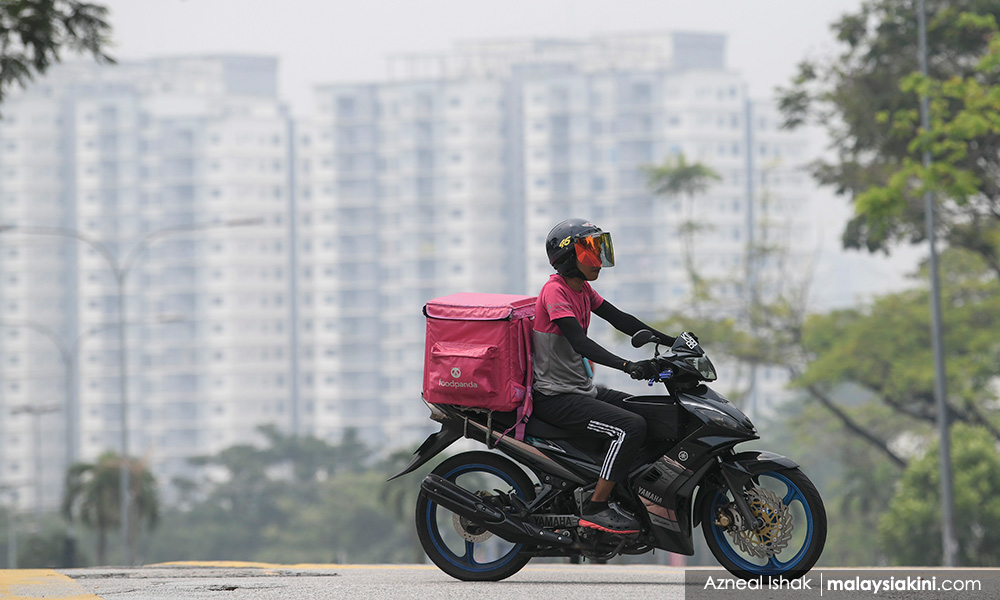LETTER | The business of food deliveries in the age of the coronavirus has been devastating for the industry.
The adverse economic impact stemming from the movement control order (MCO) has diminished the income of restauranteurs, petty traders and gig workers in various industries and outfits.
Let’s face it: food is crucial during the MCO. Disruptions to the food supply chain have been catastrophic.
The supply chain – restaurants, supermarkets, food delivery and grocery services – can keep the economy going, but in a limited capacity.
We strongly feel that there is no clear case or evidence of contamination through food delivery: in fact, contracting the virus from grocery shopping is riskier.
Delivery risks, if any, would be from contact with the delivery rider. However, food establishments now offer contactless deliveries and best practices in food handling.
Food packaging can be discarded, disinfected and disposed of like grocery bags or other products we buy.
Contrary to public opinion, food deliverers lose revenue during Covid-19, attributable to restricted F&B opening hours, limited riders, and outlet and road closures.
Many F&B establishments struggle to adapt to the takeaway/delivery only method while deliverers operate at reduced capacity.
Food deliverers support local businesses and hence, the economy.
They provide revenue for F&B outlets, hawkers, petty traders and riders in the gig economy, many from the B40 segment.
Food deliverers are the few employers during the MCO that still stimulate the economy by providing employment, helping small traders, hawkers and businesses in F&B to stay alive.
The government needs to ensure the security of companies within the essential services so that these businesses can continue to support the economy.
These businesses provide employment for many B40s in the following chain:
- Food delivery delivers food (Income for gig worker riders).
- Restaurants and hawkers sell food from buying ingredients and fresh produce from farmers and fishermen.
- Restaurants employ mostly from the B40 group.

The government should also allow food deliverers to continue services beyond 8pm.
While we support the government’s efforts to contain the virus, we must consider the consequences of limited operating hours:
- The 8am-8pm time slot triggers panic buying in supermarkets and eateries, forcing more people in crowded spaces and higher risks of infections.
- Food deliverers have restricted workers: frontliners working beyond 8pm will also have problems ordering food, leading to reduced income for gig workers, riders and restaurant staff in food delivery services.
- If the MCO’s intent is to limit movement, then adhere to the no dine-ins and adopt no takeaways for eateries, therefore only food delivery is allowed after 8pm. This is China’s approach where F&B outlets were allowed to operate until 12am.
Petty traders are impacted by the limited hours, so a need to support these businesses to survive.
While we appreciate the government’s efforts to provide the stimulus aid, the cash injection is unsustainable.
We need to support the local hawker/neighbourhood stalls. Here, we humbly propose the following solutions:
- Set time slots for takeaways and pickup services between 8am and 8pm in MCO Phase 2.
- Allow F&B outlets to operate until 11pm to cater for the late-night crowd and workers. Allow food delivery services but NO takeaways and pickup.
- The much better food delivery option promotes social distancing where customers can opt for contactless delivery while restaurants and café adopt the WHO safety and hygiene guidelines; and,
- Food/grocery delivery could decrease people movement, ensuring that the food industry, at least, remains drivers for employment and the economy.
In conclusion, the big question is, are food deliveries safe? We referenced two experts:
Prof Sally Bloomfield, honorary professor of the London School of Hygiene and Tropical Medicine
“…by having home delivery, all risks are eliminated. By comparison, coronavirus does not ‘breed’ outside the body so by the time it is delivered, any chance of infectivity is already lower because the virus starts to lose its infectivity as soon as it leaves the infected person…”
“This means that the risk of home delivery is 'very small' compared with visiting supermarkets.”
Dr James Gill, honorary clinical lecturer of Warwick Medical School
“…People could look to use food delivery services as a way to reduce their need visit supermarkets. (Delivery) highlights the importance of the imposed lockdown, as social isolation and the restriction of movement is the strongest defence that the general public has against possible Covid-19 infections.
“Should people be concerned about coronavirus exposure from groceries delivered directly to their homes? The fight against this pandemic is driven by data that is rapidly evolving and updated. In all likelihood, the risk of exposure from food delivery is less than risks of exposure to supermarket and queues at checkouts.
“Food deliveries, whether from friends/relatives or supermarket courier will carry a lower risk of exposure. Most people have bleach and cloth to wipe over home deliveries, effectively eliminating risk.”
The views expressed here are those of the author/contributor and do not necessarily represent the views of Malaysiakini.
Keep up with the latest information on the outbreak in the country with Malaysiakini's free Covid-19 tracker.
Malaysiakini is providing free access to the most important updates on the coronavirus pandemic. You can find them here.
Help keep independent media alive - subscribe to Malaysiakini.

